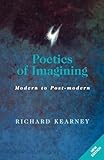Poetics of Imagining : Modern and Post-modern / Richard Kearney.
Material type: TextSeries: Perspectives in Continental PhilosophyPublisher: New York, NY : Fordham University Press, [2021]Copyright date: ©1998Description: 1 online resource (260 p.)Content type:
TextSeries: Perspectives in Continental PhilosophyPublisher: New York, NY : Fordham University Press, [2021]Copyright date: ©1998Description: 1 online resource (260 p.)Content type: - 9780823218721
- 9780823296392
- 128/.3
- online - DeGruyter
| Item type | Current library | Call number | URL | Status | Notes | Barcode | |
|---|---|---|---|---|---|---|---|
 eBook
eBook
|
Biblioteca "Angelicum" Pont. Univ. S.Tommaso d'Aquino Nuvola online | online - DeGruyter (Browse shelf(Opens below)) | Online access | Not for loan (Accesso limitato) | Accesso per gli utenti autorizzati / Access for authorized users | (dgr)9780823296392 |
Frontmatter -- Contents -- Preface -- Acknowledgements -- Introduction -- 1 The phenomenological imagination (Husserl) -- 2 The ontological imagination (Heidegger) -- 3 The existential imagination (Sartre) -- 4 The poetical imagination (Bachelard) -- 5 The dialectical imagination (Merleau-Ponty) -- 6 The hermeneutical imagination (Ricoeur) -- 7 The post-modem imagination -- 8 Vive l'imagination! -- Epilogue: Narrative imagination - the ethical challenge -- Index
restricted access online access with authorization star
http://purl.org/coar/access_right/c_16ec
What is Imagination? What is the relationship between aesthetics and ethics in a contemporary civilization dominated by the image? How can we reconcile the right to imagine with the right to justice? Are the claims of artistic creativity and moral responsibility compatible? With an extended foreword and an afterword chapter, and fascinating new material on the narrative imagination, Poetics of Imagining: Modern to Post-modern provides a critically developed and accessible account of the major theories of imagination in modern European thought. It analyses and assesses the decisive contributions made to our understanding of the imaginary life by phenomenology (Husserl, Sartre, Merleau-Ponty, Bachelard), hermeneutics (Heidegger, Ricoeur), and post-modernism (Vattima, Kristeva, Lyotard). Richard Kearney achieves this with a coherent and committed approach, which displays his own passionate concern for the claims of imagination in our post-modern world of fragmentation and fracture. This is essential reading for those interested in current leading debates on the role of imagining in continental philosophy, ethics, psychoanalysis, art theory and literary criticism.
Mode of access: Internet via World Wide Web.
In English.
Description based on online resource; title from PDF title page (publisher's Web site, viewed 03. Jan 2023)


